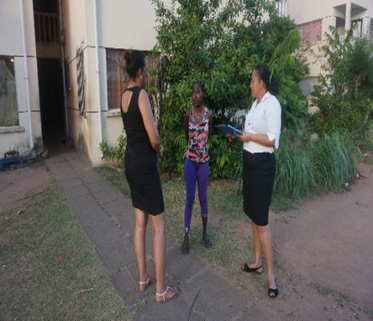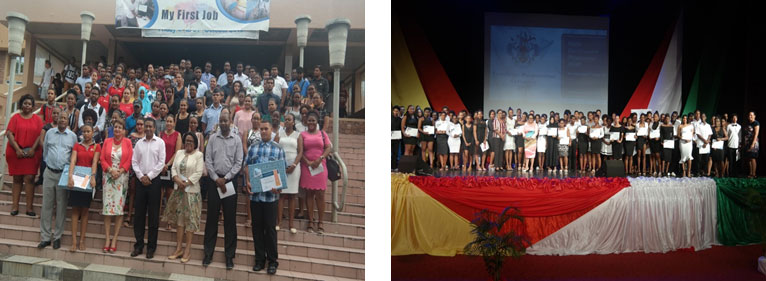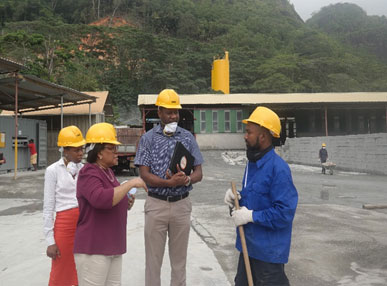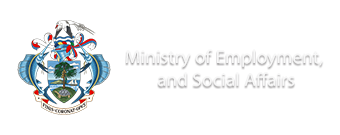Ministry of Employment, Immigration and Civil Status’ main achievements 2019
The year 2019 has been a busy year for our Ministry. Much has been achieved and this has been made possible thanks to the dedication of all the staff as well as solid collaborative approach adopted for many years now. It has not been without its fair share of challenges but we managed to push through and deliver on the majority of our targets. We would like to share some of our main achievements with you members of the public and our service users so that you have a better appreciation and understanding of our role and the services we offer to ensure we continue to grow and develop as individuals and a country as a whole.
Maintaining a low unemployment rate below the targeted 5% set for the year
The unemployment rate for 2019 published quarterly by the National Bureau of Statistics were 3.6% (Q1), 3.5% (Q2) and 2.4% (Q3). This is thanks to the several programmes introduced by the Ministry over the years in order to preserve the Constitutional rights of all citizens to work. These include the SDP “Skills Development Programme” that targets people between the age of 15-30 years to gain skills or to be re-skilled in order to secure a job, the MFJ “My First Job” scheme that is specific for graduates from professional centres so that they can secure employment as soon as they complete their studies and the URS “Unemployment Relief Scheme” that has as its main focus to assist people relying on welfare, ex-convicts and others transition into gainful employment. From January 2017 to December 2019, 6736 citizens seeking employment have gone through one of those programmes, amongst which 4144 youth.
A new strategy introduced in 2019 was an outreach campaign through door to door visits conducted in 5 districts namely; Grand Anse Praslin, Anse Aux Pins Anse Royale, Pointe Larue and Mont Buxton. Through the activity a total of 179 jobseekers were registered out of which 43 have secured permanent employment. The others were referred under the different other programmes such as the SDP and URS.
The aim of the outreach campaign is to identify and register people in the community who are unemployed; with the intention of getting them into employment in order to earn an income. The campaign also brings visibility of other programmes that exist within the Ministry. Through the door-to-door exercise, the Ministry has been able to change the livelihood of families that were in dire need.

Door-to-Door visits in district
“My First Job” scheme graduation on 14thOctober 2019 Skills Development Programme (SDP) graduation 08th November 2019

Introduction of new legislation targeting specific areas of work
Following several requests and after properly assessing the requirements, in 2019 the Ministry introduced new legislation for specific types of work in order to provide required level of protection for the workers. The norm has always been for all work to be covered under one law but this step was necessary as our labour market develops and in keeping with our international obligations. As we continue to evolve and specific studies are undertaken to assess the needs others will follow.
The first law that was introduced was the Employment (Conditions of Employment of Domestic Workers) Regulations, 2019 published in June 2019. Decent work for domestic workers means recognizing that they are real workers, that is, like other workers with labour rights. This entails acknowledging the proximity and personal relationship between them and their employer, while reaffirming the compatibility of domestic work with the employment relationship. The newly introduced law aims at providing minimum protection to a workforce that has long been playing a valuable role in families and societies. Most often they earn low wages and work for long, unlimited hours, lack social security coverage, do not belong to a workers‘ organization or trade union, and are vulnerable to abuse and harassment. The law, amongst other provisions, provides for minimum employment age being 18, daily rest period of 10 hours, standards of accommodation for live-in domestic workers.
The second law introduced in September 2019 was the Employment (Stevedore Conditions of Employment) Regulations, 2019. In a series of events, a group of stevedores from a commercial stevedoring company, initiated work stoppage asking for improvement in their welfare and pay. The stevedores were also seeking for better terms including remuneration for years of service with the company. Following these events, consultative meetings were undertaken with relevant stakeholders in order to introduce legislation to encourage the regularization of this particular work, the stabilization of incomes and other measures related to the conditions of work and living standards of stevedores in our country. With the introduction of the law, stevedores are now able to benefit from an annual gratuity and their tonnage rate provided by law, including other provisions.

Consultative meetings held with Stevedores and relevant stakeholders and partners
Monitoring of employment conditions in support of good industrial relations and safety at work
Workplace inspections are conducted on a daily basis to verify compliance with the Employment laws as well as Health and Safety legislation. The types of visits conducted are routine visits, follow up visits and investigations. Cases of compliance and non-compliance are detected through the different visits conducted in the various sectors of Industry whereas for investigations reports are received through phone calls including through the Hotline (Tel. 2804041) introduced in 2019 or aggrieved persons visiting our office.
For 2019, a total of 501 visits were conducted in different organizations on Mahe, Praslin and La Digue, routine Inspection 263, follow-ups 144 and investigation 94. Of the total visits, 138 were found to be in contradiction to employment and safety laws. 81 organizations complied after notice was issued whereas the remaining 57 are still within the deadline given to comply save for 8 that prosecution has been initiated.

Workplace visits
Law review in support of productivity enhancement at work

In addition to the yearly promotion of productivity at work through many activities at national level in several working organizations, public and private, the Ministry brought about changes to the law in 2019 in support of this very important aspect of our working life that impacts on our well-being and our country’s economy. Seychelles was amongst the countries with the highest number of days in sick leave awarded to workers yearly. For many years now employers have been asking for changes to be made in order to curtail on abuse by the workers. Through a study undertaken in 2014/2015 to assess the level of productivity in the country, although not on a large scale, absenteeism due to sick leave was found to be the main culprit affecting productivity for employing organizations. In response to the call being made by employers, the Ministry brought about an amendment to the law reducing the number of days of sick leave from 30 days to 21 days, except for working parents with children of 12 years and below who have been given an additional 7 days to care for their sick child. The change was very much welcomed by employers and workers’ representative alike.
First ever National Labour Migration Policy adopted for Seychelles

For the first time in our history Seychelles has a policy providing a framework on the effective management of recruitment of non-Seychellois workers in our country. Demand for labour continues to rise therefore the need to consolidate existing legislation, policies and procedures in this single framework in order to properly manage recruitment and address challenging areas. The NLMP is structured around four key areas of intervention with the following objectives:
- Governance of labour migration - To ensure effective institutions, procedures, and regulations are in place to govern labour migration based on reliable data and broad stakeholder participation.
- Protection of the rights of all workers - To protect the rights of migrant workers and uphold high standards of working conditions for all
- Attracting, retaining and developing skills - To ensure the right mix of skills is available in the Seychelles in order to meet labour market needs and promote productive and sustainable employment for all workers.
- Fair and effective recruitment - To promote fair and effective recruitment practices for all workers.
The policy was adopted in August 2019 and its implementation will be effected through an Action Plan providing stakeholders’ responsibility with clear actions and timeframe.
Localisation of 80 positions at supervisory and managerial level in private organiztions
The Ministry continues in its stride to ensure that companies identify locals where possible to understudy positions occupied by Non-Seychellois and under the monitoring of the Localisation programme eventually gain the necessary training and experience to take over these positions. As at December 2019, the Ministry recorded a total of 80 positions localised out of 286 registered on the programme. The posts localized were mainly from the Tourism industry at managerial and supervisory level.
In recognition of the efforts being made by various establishments to partake in the Localisation programme, the Ministry gave some publicity to establishments documenting their good practices and acclaimed staff who had successfully localised posts in several tourism establishments. This was done through a televised programme in May 2019 and two publications in the Seychelles Nation, one in October and the other November 2019.
Bilateral Labour Agreement signed with the Government of Bangladesh
On 21 October 2019, the Government of Seychelles signed a Bilateral Labour Agreement with the People’s Republic of Bangladesh. The signature of the labour agreement serves to emphasise the mutual interest of both Governments, to ensure protection of the rights of the Bangladeshi workers, their welfare and good working and living conditions while in employment in Seychelles. This is the first labour agreement between the two countries and it will be for a period of 4 years renewable.
It is to be noted that a moratorium on the recruitment of workers from Bangladesh was imposed in October 2018 in the midst of certain unsavoury recruitment practices that were being experienced. Once the Agreement was signed the moratorium was lifted and working organisations in Seychelles were able to start recruiting from there once more. The Agreement creates a framework to enable ethical recruitment practices and clearly establish the obligations of Seychellois employers, Bangladeshi workers and the authorities in both countries. The Ministry therefore does not expect there to be any more issues with recruitment from that country. The same approach will be adopted in the future with other supplying countries such as India, Sri Lanka, Kenya, Madagascar, Mauritius, Nepal starting with India in 2020, where discussions with the Embassy based in Seychelles have already started.

Technical Meeting Signing of Bilateral Agreement
Hosted labour conference for African small island states
To commemorate the 100 year existence of the International Labour Organization (ILO) and its 60 years in Africa, Seychelles was chosen to host a conference on “Creating a Sustainable Future of Work and a Just Transition towards Blue Economy in African Island States,” in May 2019. The participating countries were Cabo Verde, Comoros, Guinea Bissau, Madagascar, Mauritius, Sao Tomé and Principe, and the Seychelles. There were also observers from Mozambique and Namibia. Also present were representatives from the African Development Bank, the African Island States Secretariat, the Indian Ocean Commission, the International Organisation of La Francophonie, the Southern African Development Community, UNESCO, and Embassy of Japan to Seychelles. The purpose of the meeting was to share experiences and identify challenges and opportunities of the Blue Economy and its job creation potential across African Island States, also in line with the ILO Global Commission Report on the Future of Work. The outcomes of the conference were echoed at international meetings attended by Seychelles delegation, mainly the UN Climate Change Summit in September 2019 and the ILO 14th African Regional Meeting held in December 2019. The agreed outcomes of the conference were:
- Approaches to better integrate youth into the blue economy
- Strengthening investment in the blue economy
- Ensuring fair migration
- Promoting the transition from the informal to the formal economy

Compliance with international reporting obligations
In line with its obligation as a member state of the International Labour Organization (ILO), Seychelles submitted all reports due in 2019 on ratified Conventions as per Article 22 of the ILO Constitution. The reports provided information on national laws, practices, statistics and challenges on the subjects requested and it is an opportunity to obtain the support of the ILO. The reports were based on the following ILO Conventions:
Forced Labour Convention, 1930 (No. 29)
Abolition of Forced Labour Convention, 1957 (No. 105)
Minimum Age Convention, 1973 (No. 138)
Worst Forms of Child Labour Convention, 1999 (No. 182)
Labour Inspection Convention, 1947 (No. 81)
The report on unratified ILO Conventions due in 2019 was also submitted to the ILO in accordance with Article 19 of its Constitution. This time, this report provides information on a group of Conventions not ratified by Seychelles, with anticipation for future ratification, based on the challenges highlighted. The report was based on the Employment Policy Convention, 1964 (No. 122); Vocational Rehabilitation and Employment (Disabled Persons) Convention, 1983 (No. 159); Home Work Convention, 1996 (No. 177); Vocational Rehabilitation and Employment (Disabled Persons) Recommendation, 1983 (No. 168); Employment Policy (Supplementary Provisions) Recommendation, 1984 (No. 169); Home Work Recommendation, 1996 (No. 184); Employment Relationship Recommendation, 2006 (No. 198) and; Transition from the Informal to the Formal Economy Recommendation, 2015 (No. 204).
The following list of ILO instruments was also submitted to the ILO as per its Constitutional obligation for member states to submit to national competent authority, the instruments adopted by the ILO Conference. The Recommendations are not legally binding and not applicable for ratification, however they serve as guidance to member states for best practices and legal framework. In 2019, the Ministry submitted the following six instruments to ILO:
R.193 - Promotion of Cooperatives Recommendation, 2002
R.195 - Human Resources Development Recommendation, 2004
R.198 - Employment Relationship Recommendation, 2006
R.200 - HIV and AIDS Recommendation, 2010
R.202 - Social Protection Floors Recommendation, 2012
R.204 - Transition Informal Formal Economy, 2015
International Labour Conference in Geneva, Switzerland

Conclusion
The Ministry would like to thank its partners and all stakeholders for their support throughout 2019 and looks forward to the continued collaboration in 2020, moving forward in our drive for progress for the betterment of our people and country’s economy. We welcome your contributions in any shape or form. Please contact us:
Main office: Independence House, Independence Avenue, P.O. Box 1097, Victoria, Mahe.
Tel: 4297200, email: This email address is being protected from spambots. You need JavaScript enabled to view it. website: http://www.employment.gov.sc
Praslin office: Pension fund Complex, Room 16, Grand Anse Praslin
Tel: 4232031
La Digue office: Pension Fund Building, La Passe, La Digue
Tel: 4234052
CONTRIBUTED BY: Ministry of Employment, Immigration and Civil Status



